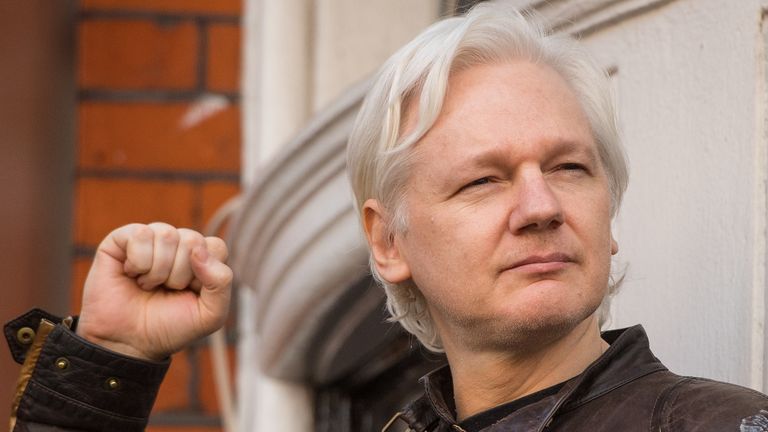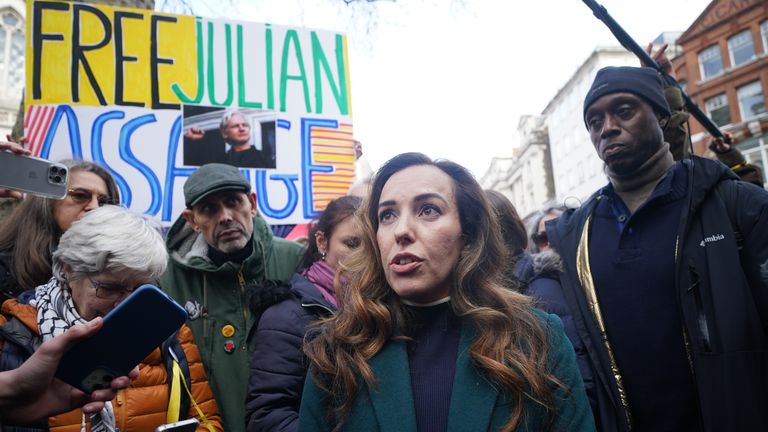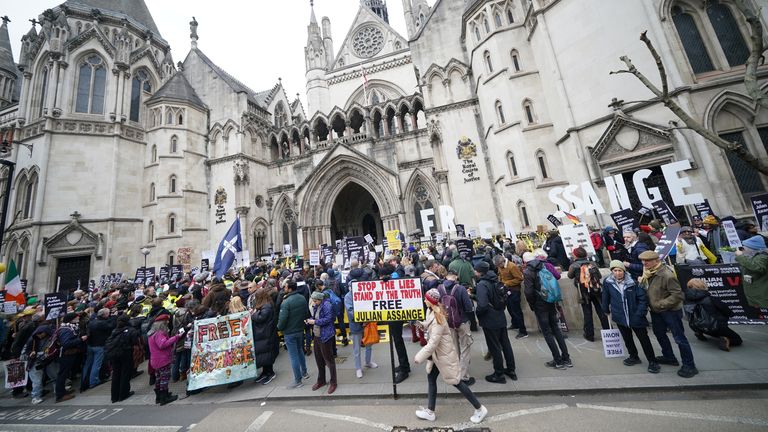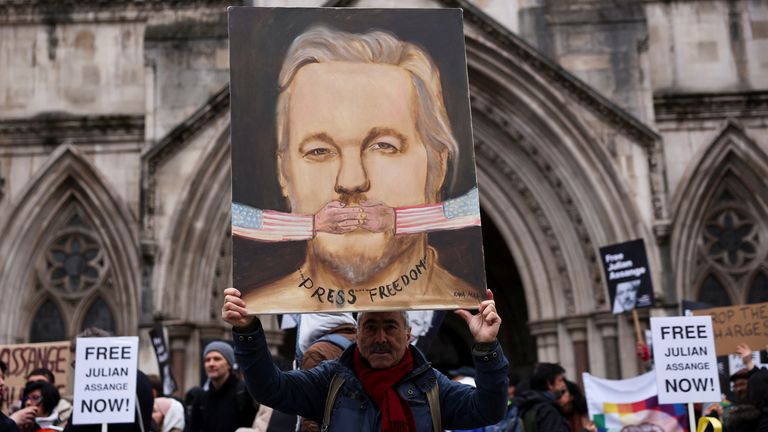'Unwell' Julian Assange fails to attend court hearing - as wife claims he would 'not survive' extradition to US
Among a crowd of supporters outside the Royal Courts of Justice, Stella Assange claimed her husband had not done anything wrong, and if sent to the US he would never be a free man.
Tuesday 20 February 2024 18:25, UK
Julian Assange's wife has told Sky News he will "not survive" if he is extradited to the US as the WikiLeaks founder makes what is his last bid for an appeal in the UK.
Assange is at risk of being sent to America within days to answer charges alleging the 52-year-old helped former military analyst Chelsea Manning download top secret intelligence files which WikiLeaks published online.
Hundreds of thousands of documents were published on the website owned by Assange in 2010 and 2011 disclosing US national defence information relating to the Afghanistan and Iraq wars.
Read more: Why is Julian Assange in court again?
At the start of a two-day hearing at London's High Court on Tuesday, his wife Stella Assange said her husband has not done anything wrong and his "life is at risk" every day he is in prison.
"Julian's life is at risk, every day he is imprisoned his life is at risk. If he is taken to the US he will never be a free man again," she told Sky News.
"He will not survive it.
"The US wants to put him in the deepest, darkest hole of the US prison system for publishing the truth."
Before the hearing, lawyers for Assange said that he was unwell and would not be attending court, despite being given permission from Belmarsh maximum-security prison, where he has been held for five years.
The appeal comes after a January 2021 ruling that he could not be extradited due to his risk of suicide in a US prison. But the decision was later overturned after the US gave additional assurances.
This week is the final stage of the UK appeals process, which involves Assange's legal team asking for the green light to challenge the previous judge's dismissal of other parts of his case against extradition.
If the team loses, they may appeal to the European Court of Human Rights which could order a stay on Assange's extradition by issuing a Rule 39 instruction. But such instructions are only given in "exceptional circumstances".
'State retaliation'
In court, one of Assange's barristers Edward Fitzgerald KC, said he is being prosecuted for "ordinary journalistic practice of obtaining and publishing classified information, information that is both true and of obvious and important public interest".
While another, Mark Summers KC, argued the US prosecution of Assange would be retribution for his political opinions, meaning it would be unlawful to extradite him under UK law.
The barrister said: "This is a paradigm example of state retaliation for the expression of political opinion."
Both had argued in a written statement that the evidence showed the US was prepared to "go to any lengths" to protect US officials over "torture/war crimes" allegedly committed and "suppress those actors and courts willing and prepared to try to bring those crimes to account".
Mr Summers later told the court that US authorities had developed a "breathtaking" plan to either kill or kidnap Assange while he was in the Ecuadorian embassy, where he remained for around seven years.
Read more:
Fugitive or hero? A timeline of Assange's legal fight
Government approves Assange extradition order
Acid to destroy expensive art if Assange dies in prison
He said the plan "only fell apart when the UK authorities weren't very keen on the thought of rendition, or a shootout, in the streets of London".
'I don't know if I will see him again'
Outside the Royal Courts of Justice, a crowd gathered to support Assange including politicians, journalists and members of the public including Jodie Asard who travelled with her son from Adelaide, Australia, for the appeal case.
Protesters were seen waving Australian flags, holding placards with the words "Free Julian Assange" and "drop the charges", and chanting "there is only one decision - no extradition" and "US, UK, hands off Assange".
Mrs Assange told Sky News that she was "overwhelmed" by all the support outside court.
She described the process as being "very difficult".
"I saw Julian on Saturday and I realised afterwards that I don't know if I will see him again, so it is just impossible to explain what we are going through," she said.
US authorities are opposing Assange's bid for an appeal, telling the court his case is "unarguable" and should not be allowed to proceed to a full hearing.
James Lewis KC, for the US, is expected to make oral arguments to the court on Wednesday when the hearing is due to make a decision on whether Assange can bring the appeal at a later date.






